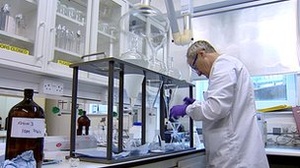
New Managing Director for Bellona Norway
The Board of the Bellona Foundation has appointed former Minister of Climate and the Environment Sveinung Rotevatn as Managing Director of Bellona No...
News

Publish date: April 11, 2012
Written by: Charles Digges
News
The Alba na Mara research vessel spent the weekend at sea taking samples near Total’s leaking Elgin gas platform which were then analyzed. The platform was evacuated after gas started leaking on Sunday 25 March.
Engineers meanwhile visited the platform for the second time today in preparation to kill the well, said Total. Their first visit was last Thursday.
The Scottish government said specially trained “sensory testers” at the Aberdeen, Scotland-based Marine Scotland Science organization sniffed and tasted seven different species of fish collected near Total’s leak-stricken Elgin platform earlier this week.
Scottish Environment Secretary Richard Lochhead announced their verdict Wednesday in a statement on the government’s website.
“They are untainted by hydrocarbons,” he said.
Bellona President Frederic Hauge said earlier he had not expected that the ongoing gas leak at the Total’s Elgin Platform would have a significant impact on the marine environment.
“It the end, it is not a gas leak directly into the sea so I do not expect to see extensive damage to marine ecosystems,” he said Tuesday.
“The area is not a particularly important fish spawning ground, nor is it an important habitat for sea foul. It is a very dangerous situation, certainly, but it is not an environmental catastrophe at the moment.”
He did caution however, that climate data, once revealed, may be damning. The primary component of the gas, which is still being released at a rate 200,000 cubic meters a day, is methane – 20 times as potent a greenhouse gas than carbon dioxide.
Full chemical testing of all environmental samples is continuing, with initial results expected by the end of the week.
The fish samples collected for an expert panel covered cod, haddock, whiting, plaice, lemon sole, herring and mackerel, Environment Secretary Richard Lochhead said in a statememt.
“The environmental impact of this gas leak has been minimal so far, however it’s important we take precautions and analyse all available data,” he said. “Therefore it’s reassuring that sensory testing of the fish samples gathered by the Alba na Mara have found they are untainted by hydrocarbons.”
He added that: “Full chemical analysis work – including water and sediment samples – is ongoing and will provide further clarification on any impact.
Marine Scotland Science have the “necessary knowledge, skills and experience to carry out this work effectively, including the UK’s only specially trained sensory panel, “ continued Lochhead’s statement, adding, “We will continue our monitoring activities for the duration of this incident, so we can assess any impact on the marine environment and respond as needed.”
Engineeers meanwhile have made their second trip to the Elgin Platform – the first having occurred last Thursday – as part of preparations for well-intervention work aimed at shutting down an ongoing gas leak.
“Over the coming weeks, there will be several helicopter flights to the platform to undertake the required preparations and bring the necessary equipment before the well intervention can begin,” the French major said in a terse statement at about 9 pm Paris time Tuesday.
Engineers have opted to attempt a “dynamic kill” which involved injecting heavy mud into the well over a period of weeks.
The contingency plan is a far more time consuming and costly measure of digging two relief wells. Transocean’s Sedco 714 was en route to the site for arrival as early as Today.
It is one of two rigs, the other being the Rowan Gorilla V, hired to drill relief wells at the site if the dynamic kill fails.

The Board of the Bellona Foundation has appointed former Minister of Climate and the Environment Sveinung Rotevatn as Managing Director of Bellona No...

Økokrim, Norway’s authority for investigating and prosecuting economic and environmental crime, has imposed a record fine on Equinor following a comp...

Our op-ed originally appeared in The Moscow Times. For more than three decades, Russia has been burdened with the remains of the Soviet ...

The United Nation’s COP30 global climate negotiations in Belém, Brazil ended this weekend with a watered-down resolution that failed to halt deforest...